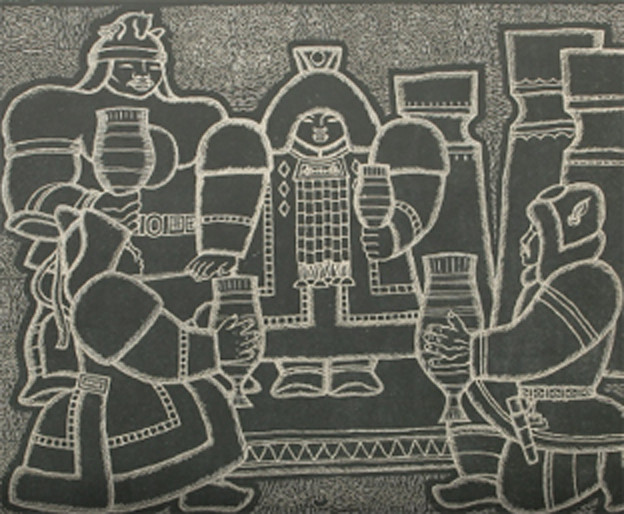After Nikolai Petrovich Burnashev: from 'The Olonkho' (a Sakha [Yakut] epic) as an addendum to 'Technicians of the Sacred'

Translation by Justin E. H. Smith
[Translator’s note: This is a translation of some of the early lines of the Olonkho, the Sakha (Yakut) national epos (on my longstanding interest in this, read more here and here). I worked directly from the Sakha text, but also relied heavily on an earlier Russian version, which comes down to us from a Sakha elder by the name of Nikolai Petrovich Burnashev. His version was recorded by S. K. D’iakonovyi in 1941, and published under the title Кыыс Дэбилийэ in Novosibirsk in 1993.
My own version is so heavily reliant on Burnashev that it cannot be considered a translation from the Sakha, but rather a blend of features from both the Sakha and the Russian. I have however tried to respect the meter of the original text, even at points where the syntax and grammar proved too challenging for me to decipher unaided. For an online bilingual version, with side-by-side Sakha and Russian, go here. — J.R.]
Under that primordial
shining and lucid sky,
where the two-legged, having
a mortal body and hollow bones,
knowing war and battle,
acquainted with strife and discord,
having a vulnerable brain
and a trembling soul,
must be fruitful —
with the cool windy western sky,
with the good generous eastern sky,
with the insatiable thirsty southern sky,
with the impetuous whirling northern sky,
with the shivering breadth of the sea,
with the heaving depth of the sea,
with the swelling abyss of the sea,
with the twirling axis of the sea,
with the unbounded reach of the sea,
with the revered aiy* who lie beyond,
with the radiant aiy who guard,
with abundant yellow nectar**,
with generous white nectar,
encircling us in the manifold of stars,
in the herds of countless stars,
in the traces of rare stars,
with the full moon accompanying it,
with the bright sun leading it,
with purifying roars of thunder,
with the smite of bolts of lightning,
with moistening cloud-bursts of rain,
with sultry hot breath,
with the drying out and again the replenishing of waters,
with the falling down and again the growing up of woods,
with inexhaustible generous gifts,
with origins from gently sloping mountains,
with gardens from earthen mountains,
with a hot and giving summer,
with the turning axis of the center,
with four converging sides,
with such high firmament,
what you tread on, will not give way,
what you rattle, will not lurch,
with such an unfathomable breadth,
what you press, will not bend,
eight-chambered, eight-sided,
with six circles,
with disquiet and worry,
in luxurious attire and ornament,
serenely peaceful,
always-existing Mother Earth,
shining like a silver buckle
on a horned hat with a feather.
*aiy (айыы) — benevolent nature divinities.
**‘nectar’ — илгэ, a divine drink, comparable to Greek ambrosia, which in this instance seems to be assimilated to milk, which in turn is conceived as the substance of the white bodies of the sky.
[NOTE: Justin Erik Halldór Smith (b. 1972) holds dual US and Canadian citizenship. He studied at the University of California and took his PhD at Columbia University (2000). In 2013 he was appointed university professor at the University of Paris Diderot. A prolific writer and provocative thinker, his recent books include The Philosopher: A History in Six Types and the forthcoming Irrationality: A History, both from Princeton University Press, and his more general essays have been published in Harper’s, The New York Times, and on his blog www.jehsmith.com.]
Poems and poetics